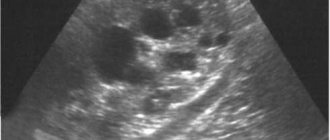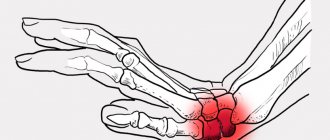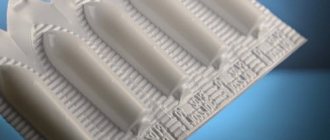Unpleasant acquaintance
Hemorrhoids are a condition of the rectum that causes pain, inflammation, and bleeding from the anus.
Recently, this disease has become permanent. Statistics show that 40% of the population suffers from diseases of the rectum. This is mainly the working population.
Surprisingly, the majority of those suffering from hemorrhoids are men, and only a quarter of this fate is attributed to women.
Unfortunately, many of them go to the doctor only in emergency cases, because they are either embarrassed or prefer to endure it. And only the progression of the disease makes one think seriously about the cause and nature of the disease.
The purpose of this article is to provide the most complete information about specialists who can provide full medical care for hemorrhoids.
What is the cause of hemorrhoids?
Almost any person is susceptible to the formation of hemorrhoids (the disease can appear even in adolescence). The reason for this is certain circumstances. These include:
- chronic constipation;
- constant use of a cleansing enema or laxative;
- sedentary lifestyle;
- lifting heavy objects;
- frequent use of diets, which are also incorrectly formulated;
- state of pregnancy and birth of a baby;
- playing some sports;
- predisposition at the genetic level;
- excessive consumption of alcoholic beverages, as well as spicy and fatty foods;
- disruption of hormonal levels;
- frequent exposure to stress.
The risk group includes people in the following professions: driver, builder, accountant, programmer, salesperson, office employee. Representatives of the female sex are most predisposed to the manifestation of hemorrhoids - pregnant women or those who have given birth.
Since for most people the proctologist is simply unknown, it is necessary to pay a little attention to the specialization itself. About 20 years ago, the doctor was simply called a “proctologist.” But in 1997, for some reason (but they say that due to greater accuracy of the description), the doctor was officially renamed a “coloproctologist.”
Briefly about the causes and symptoms
Only when faced with the disease itself does a person begin to think about the causes of its occurrence. It turns out that not only older people suffer from hemorrhoids; it is common to all age categories.
The reasons for its occurrence are varied:
- lifestyle associated with sedentary work;
- improper and irregular nutrition;
- work involving heavy physical activity;
- excessive consumption of spicy foods;
- genetics;
- failure to comply with safety regulations for certain sports.
In order to start treatment on time, it is necessary to know the symptoms of the disease.
Symptoms of hemorrhoids:
- feeling of discomfort in the rectal area;
- heaviness during bowel movements;
- discomfort in the anal area, reminiscent of a burning sensation;
- the appearance of pain during bowel movements and physical activity;
- development of constipation;
- the formation of nodes and their protrusion outward;
- presence of elevated temperature;
- the appearance of blood in the stool.
Any pain in the rectal area should immediately alert you and force you to consult a specialist. If these requirements are ignored, the inflammatory process will develop further, the skin of the intestine will begin to deplete and this will cause the formation of hard-to-heal anal fissures.
From the newfound pain, it will seem to a person that life has ceased to exist. Isn't it easier to do everything on time?
When asked which doctor to contact for hemorrhoids and related diseases, the answer is simple: it should be a proctologist or coloproctologist. Only a specialist in his field can make an accurate diagnosis and prescribe the correct treatment.
Determining the cause of bleeding plays an important role, since this symptom can hide a large number of unpleasant diseases, which include oncology.
Causes
The following persons are at risk for developing this disease:
- Leading a sedentary lifestyle.
- Suffering from chronic constipation.
- People whose field of activity is associated with harmful activities: programmers, truck drivers, office workers, hairdressers, etc.
- Lifting heavy loads.
- Poor nutrition.
- Heredity.
- Alcohol abuse.
Only a competent specialist will be able to find out the true cause of the appearance of characteristic symptoms.
Recommendations for preparing for a doctor's examination
Before examining a proctologist, it is necessary to carry out preliminary evening and morning bowel cleansing. The most effective method to date is an enema.
A backup option is a microenema with the drug Microlax, which must be done on the day of administration.
Items to take to your doctor's appointment:
- napkins;
- a disposable towel or diaper, which can be bought at a pharmacy kiosk.
What does a coloproctologist treat?
Not so long ago, a specialist who treated hemorrhoids and other pathologies of the rectum was called a proctologist. Now the scope of activity of a proctologist has expanded and his competence includes the treatment of diseases of the colon. In this regard, the nomenclature of specialties was revised and at this point in time, a specialist involved in the treatment of hemorrhoids is called a coloproctologist.
- How to prepare for a doctor's examination? Before visiting a coloproctologist, it is necessary to carry out some preparatory measures. First of all, this concerns cleansing the intestines. To do this, you should give an enema. For high-quality cleansing, an enema is given twice in the evening and after sleep. As an option, use the drug Microlax in the form of microenemas. The procedure is performed once - in the morning, on the day of the visit to the specialist. Bowel cleansing is mandatory for performing rectoscopy.
- Can there be hemorrhoids without blood? At the first stage of development of the disease, blood loss may be absent. However, bleeding is a symptom specific to hemorrhoids and can be quite heavy. Blood appears even with internal hemorrhoids, however, this is not the only sign of the disease.
- Can hemorrhoids go away on their own? The disease cannot go away on its own. Moreover, nodes without therapy are prone to constant growth. Treatment with folk remedies can only somewhat slow down the pathological process, as well as reduce its symptoms.
- Is pain inevitable after hemorrhoid surgery? Modern surgery can treat this pathology of the rectum using minimally invasive operations. Nodes can be removed without pain or other unpleasant consequences of the operation.
- For pain in the anus - a diagnosis of hemorrhoids? Pain in the anus does not always indicate hemorrhoids. Sometimes there is no pain at all, and begins to bother a person only in the later stages of the development of the disease. They usually occur when the nodes become inflamed and fall out. Pain in the rectum can indicate a variety of diseases. Finding out the cause of their occurrence is within the competence of a coloproctologist.
- Is an examination by a coloproctologist always painful? Pain can only occur when the patient has certain intestinal pathologies. Against the background of complete health, the examination by this specialist is painless.
- Are hemorrhoids a disease of older people? Statistics clearly indicate that the disease often occurs in people under 30 years of age. However, hemorrhoids are often diagnosed in patients over 45 years of age. The first symptoms of the disease may occur at a young age, and as maturity approaches, hemorrhoids will progress.
- Can hemorrhoids be treated with laxatives? Getting rid of constipation does not mean getting rid of hemorrhoids. In addition, diarrhea can only provoke the development of the disease.
Why shouldn't you be afraid of a coloproctologist?
There are many more reasons to see a doctor than to avoid it:
- The inspection is unpleasant, but necessary. Does not cause pain.
- In some cases, minor pain is possible, which is associated only with the patient’s negligence due to his late contact with a specialist. A highly qualified doctor will conduct a proper examination, and the amount of pain will be minimal.
- Do not be afraid that you will immediately be offered to resort to surgical intervention. This is unlikely. Modern treatment methods make it possible to cure hemorrhoids without surgery. In some cases, only the use of suppositories is sufficient.
What causes hemorrhoids in women?
Unlike male hemorrhoids, the female form of the disease can progress due to circumstances independent of lifestyle, for example, when a woman is pregnant. The phenomena that cause hemorrhoids in women also differ: if in men the prevailing factor is considered to be poor nutrition, in women this role is played by insufficient blood circulation due to pressure on the internal organs of the growing uterus and other physiological changes that occur during pregnancy.
In recent years, cases of the disease occurring in the fairer sex as a result of an incorrectly selected diet have become more frequent. Thus, overly zealous cleansing of the intestines using folk remedies or pharmaceutical drugs is the second most common cause of hemorrhoids in women. And this is not surprising, because against the background of limiting the amount of nutrients and microelements that keep blood vessels in good shape, there is constant irritation of the intestines with laxatives.
However, the most important factor influencing the likelihood of hemorrhoids in women remains a hereditary predisposition to weakness of the vascular wall. The beginning of negative changes can be provoked by:
- pregnancy and childbirth;
- anal sex;
- colon cleansing;
- stressful situations;
- lifting weights;
- dietary errors that cause constipation or diarrhea.
Almost all of these points take place in the lives of representatives of the fairer sex, and therefore the question of whether women have hemorrhoids often makes specialists smile. Of course, it happens, but this disease is not always advanced in the fairer sex, because women tend to worry about their health more than men.
We recommend reading: Is it painful to do a colonoscopy without anesthesia: reviews and feelings of patients, consequences
Basic responsibilities and rights of a specialist
The responsibilities of a proctologist include:
- consultation of the patient and his examination, which can be either visual or manual, in some cases instrumental;
- writing out directions for tests and diagnostics;
- stopping or confirming an accurate diagnosis;
- prescription of treatment;
- if necessary, perform surgical procedures necessary to treat the patient at the outpatient clinic;
- Constant monitoring of the patient’s health from the very beginning of diagnosis until complete recovery.
An attending physician working in a hospital has the right:
- admit the patient to the hospital and confirm the preliminary diagnosis;
- carry out diagnostic measures;
- prescribe the correct treatment and independently monitor its implementation;
- change the treatment method at your discretion depending on the stage of the disease;
- to give first aid;
- a practicing coloproctologist surgeon has the right to perform surgery.
Any highly qualified coloproctologist should provide full consultation on the treatment of hemorrhoids.
The patient must independently understand what disease he has contracted, what caused it, whether it can be treated, and how his life must change further in order to completely cure the disease.
At the same time, a coloproctologist must be a real psychologist, since patients must completely trust him and not be afraid to tell even the smallest details about the disease.
Doctors with positive energy are usually experts in their field.
Only this specialist has the right to perform the operation.
Typically, a specialist is consulted in cases where previous treatment has not brought any results and surgical intervention is required.
Additional specialists
If we talk about which doctor treats hemorrhoids, then a proctologist will be the best option. However, not all hospitals have doctors of this specialization. As a backup option, a patient with symptoms of acute hemorrhoids can contact a surgical doctor. If a person is diagnosed with a chronic course of the disease, then you can go to a therapist.
When a doctor deals with a particular patient’s hemorrhoids, he may make several referrals for consultation with the following specialists:
- phlebologist (deals with pathological conditions of venous vessels);
- an angiologist (studies any vessels, a referral is issued in the absence of a phlebologist);
- nutritionist (for nutrition correction).
With the help of these doctors, the causes of the pathology are identified and corrected as much as possible, which reduces the risk of relapse and speeds up recovery.
Who else can help?
Which doctor should a man or woman go to with hemorrhoids if there is no coloproctologist in the hospital?
Sometimes it happens. In small rural areas such specialists have never been seen. What should a patient do in this situation? Which doctor can he get qualified help from?
These doctors exist! In the absence of a proctologist, any patient can confidently turn to:
- local therapist or family doctor;
- gynecologist (if the woman is pregnant);
- surgeon
Of course, a coloproctologist can provide the most complete consultation, but these doctors can also diagnose hemorrhoids and prescribe effective treatment.
Practice shows that these doctors, when treating hemorrhoids, use the classic treatment regimen and do not like to experiment.
How to prepare for a proctologist's visit
Before starting therapy, you need to tell your doctor in detail about what specifically is bothering you.
Many representatives of the stronger sex are interested in whether it is possible to consult a surgeon with hemorrhoids. This question is related to the fact that a person has a certain amount of embarrassment in front of a member of the opposite sex, and surgeons, as a rule, are men.
You can contact a surgeon at the initial stage , but you should still put aside all fears and embarrassment and visit a more specialized specialist. It is not without reason that they say that a doctor is a sexless being.
Before visiting a proctologist, you should do an enema at home
You need to put aside embarrassment, since you decided to come to the doctor, and tell everything in detail. This will help quickly establish the correct diagnosis and prescribe treatment.
Special preparation for the visit is required. You must first do an enema at home and perform hygienic manipulations in the anus.
What are the consequences of not treating hemorrhoids?
For those specialists who treat hemorrhoids in women, positive dynamics are important. However, some patients of proctologists do not always comply with the recommended treatment tactics, or even completely forget that they need long-term treatment. Such a neglectful attitude towards one’s own health can result in many complications:
- iron deficiency anemia due to blood loss even as a result of minor bleeding from the rectum;
- thrombophlebitis of hemorrhoids (acute thrombosis of hemorrhoids);
- purulent paraproctitis;
- chronic anal fissure.
- anal incontinence (fecal incontinence).
An equally dangerous consequence of untreated hemorrhoids is severe swelling of the anus, making it impossible to defecate.
Important! Remember that any problem is best dealt with by a specialized specialist, and proctology is no exception. Only a proctologist can plan and carry out qualified treatment.
Diagnosis of the disease
As noted earlier, hemorrhoids are a very insidious disease that can lead to many serious complications, so you should not delay its treatment. Therefore, when you first suspect this disease, immediately go to the hospital and under no circumstances try to cure it yourself. Once you have an appointment, the doctor will first examine you and then send you for examination. They are necessary not only to determine the complexity of hemorrhoids, but also to identify its causes.
The most commonly prescribed tests are:
- anoscopy;
- sigmoidoscopy;
- colonoscopy;
- irrigoscopy.
The doctor decides which research method to prescribe based on the results obtained during the initial examination of the patient.
Basic therapy methods
The treatment program is selected individually for each patient. The following factors are taken into account:
- stage and characteristics of the disease;
- form of hemorrhoids - acute or chronic;
- localization of blood angioma;
- presence of complications;
- patient's age;
- the presence of allergic reactions to various drugs;
- clinical picture of the patient.
When the disease has not yet developed into an acute form, conservative treatment methods are used, based on the use of drugs that help strengthen blood vessels, as well as ointments and creams. In addition, doctors recommend sticking to proper nutrition, losing extra pounds and leading an active lifestyle.
If drug treatment is ineffective, the following methods of surgical therapy are prescribed:
- latex ligation;
- disarterization;
- cryotherapy;
- sclerotherapy of hemorrhoids;
- laser coagulation.
At more complex stages of hemorrhoids, serious operations are used, which can be either open or closed. The therapy and rehabilitation itself does not take much time if you know which doctor treats hemorrhoids in men and women.












